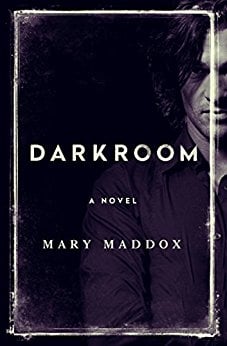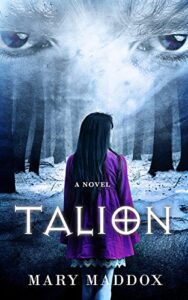DARKROOM came in first in the fiction category of the 2017 IndieReader Discovery Awards, where undiscovered talent meets people with the power to make a difference.
Following find an interview with author Mary Maddox.
DARKROOM is a suspense thriller. The paperback edition was published March 31, 2016. The ebook was published about a month later on May 3, 2016.
What’s the book’s first line?
Some photographs speak for the dead.
What’s the book about? Give us the “pitch”.
Day Randall, a gifted but unstable photographer, has gone missing. No one cares except her friend Kelly, who follows the trail into an underworld of drugs, violence, and ruthless men who will do anything to protect their secrets. If Kelly trusts the wrong person, she’ll be the next to disappear.
What inspired you to write the book? A particular person? An event?
I rewrote DARKROOM several times. The final version is radically different from early drafts, which centered on Gregory Tyson (Gee) and his obsession first with Day and then with Kelly. Gee was a sensitive teen born into a family of psychopaths. Struggling to escape their life, he moved to Colorado to study art but fell back into the drug dealing that he learned from his brother. Although he loves Day, he draws her into his darkness.
I ended up with a story so depressing that nobody enjoyed reading it. Since I was teaching full time at Eastern Illinois University, I put the manuscript aside for a couple of years. Then I joined a critique group, the Writer Babes. They gave me a lot of help with my horror novel, TALION, so I began showing them chapters of DARKROOM. Their feedback persuaded me to make Kelly the focus of the story.
After rewriting almost to the end, I put the novel aside and began DAEMON SEER. The Babes were not happy when I abandoned Kelly in the worst kind of peril to write a horror novel that interested them far less. They made sure I went back to DARKROOM and finished the story.
What’s the main reason someone should really read this book?
Read DARKROOM if you enjoy page-turners with plenty of plot twists and believable characters that you can care about. Its world is violent and dark, but not hopeless.
Is DARKROOM the first book you’ve written?
I’ve written several novels and numerous short stories, but my early work isn’t good enough for publication. You can read a few of my stories in online magazines, and I give a couple away through Instafreebie. I’ve published two novels in addition to DARKROOM.
TALION is a horror novel featuring Lu Jakes, a fifteen-year-old girl who sees daemons, and Rad Sanders, the serial killer who stalks her. Unlike standard demons, the spirits in this novel are ambiguous in nature—not entirely evil but certainly not good. I call them daemons to avoid the inevitable associations with the demons in TV shows like Supernatural (a series that I enjoy very much).
Chief among the daemons is Talion, beautiful and hypnotic. He comforts Lu and give her the courage to defend herself against bullies at school, but his sinister companion Black Claw tempts her to kill her abusive stepmother. When Rad threatens Lu and a newfound friend, she needs the daemons’ help to survive. It’s far from clear that she can depend on them.
One challenge in writing TALION was imagining the point of view of a serial killer. I read a few dozen books on the topic and learned more than I wanted to know about the rage and cruelty in some human beings. Some gruesome images stained my imagination, and the stains seem to be indelible.
DAEMON SEER is the sequel to TALION. It picks up the lives of Lu and several other characters ten years after the events of the first novel. I worked hard to write a story that stands on its own so readers can understand and enjoy it without having read TALION.
What do you do for work when you’re not writing?
Now that I’m retired from teaching, I spend my spare time playing Scrabble at our local club and riding my horse, Gandalf.
How much time do you generally spend on your writing?
I probably average about three hours a day.
What’s the best and the hardest part of being an indie?
Having control over the publication of my books is the best part of being an indie. Paradoxically, it might also be the hardest part. I can choose any book cover within my budget, but especially if I’m inexperienced, I might end up with a poorly designed cover or one that doesn’t appeal to the book’s readers. In that case, the mistake and its consequences are all mine. Same thing with professional editing and proofing. If I skimp on editing the manuscript, I get to endure the justified criticism of readers and reviewers with no one but myself to blame. And my resources are limited. Most importantly, I don’t have access to the kind of distribution that places books in bookstores.
Would you go traditional if a publisher came calling? If so, why?
I might, depending on what kind of deal the publisher offered.
I had two agents before going indie. Although both were accomplished and honest, neither agent succeeded in placing my work with a publisher. Eventually they cut me loose. At the time, the rejection hurt. But literary agents, like publishers, are in business to make money. They invest time and money in the projects they take on. It’s unrealistic to expect them to keep investing in an unprofitable book. Eventually I realized that I was more dedicated to my writing than they would ever be. I also got tired of making changes that felt wrong in order to satisfy their demands.
Operating my own press, tiny as it is, has given me sympathy for publishers. As the owner of Cantraip Press, I’ve published about twenty authors besides myself (mostly in anthologies). While most of them are delightful, a few are demanding and self-centered. They balk at making even minor revisions and have tantrums over a single typo. Authors occasionally approach me with the entitled attitude that of course their manuscript is a work of brilliance and of course I’ll leap at the chance to publish it. They have no idea how much money and work it takes to publish a book. I’ve had to pass up manuscripts that I love because I didn’t have the resources to publish them.
Is there something in particular that motivates you?
There’s an old Latin saying, sic transit gloria. Fame passes. If anything, it passes more quickly now than in ancient days. I won’t waste time chasing after fame. Money is handy, but I don’t write fast enough to earn a living writing fiction.
More than anything, I want people to read and enjoy my books. I price them just high enough so that readers will respect what they’re paying for. Some readers won’t appreciate my stories, but that’s not their fault or mine. I want my books to find their way to the people who are meant to read them. That’s my goal.


